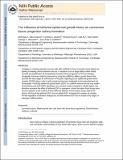The influence of tethered epidermal growth factor on connective tissue progenitor colony formation
Author(s)
Marcantonio, Nicholas A.; Boehm, Cynthia A.; Rozic, Richard J.; Au, Ada; Wells, Alan; Muschler, George F.; Griffith, Linda G.; ... Show more Show less
DownloadGriffith_Influence tethered.pdf (1.863Mb)
PUBLISHER_CC
Publisher with Creative Commons License
Creative Commons Attribution
Terms of use
Metadata
Show full item recordAbstract
Strategies to combine aspirated marrow cells with scaffolds to treat connective tissue defects are gaining increasing clinical attention and use. In situations such as large defects where initial survival and proliferation of transplanted connective tissue progenitors (CTPs) are limiting, therapeutic outcomes might be improved by using the scaffold to deliver growth factors that promote the early stages of cell function in the graft. Signaling by the epidermal growth factor receptor (EGFR) plays a role in cell survival and has been implicated in bone development and homeostasis. Providing epidermal growth factor (EGF) in a scaffold-tethered format may sustain local delivery and shift EGFR signaling to pro-survival modes compared to soluble ligand. We therefore examined the effect of tethered EGF on osteogenic colony formation from human bone marrow aspirates in the context of three different adhesion environments using a total of 39 donors. We found that tethered EGF, but not soluble EGF, increased the numbers of colonies formed regardless of adhesion background, and that tethered EGF did not impair early stages of osteogenic differentiation.
Date issued
2009-06Department
Massachusetts Institute of Technology. Department of Biological Engineering; Massachusetts Institute of Technology. Department of Mechanical EngineeringJournal
Biomaterials
Publisher
Elsevier
Citation
Marcantonio, Nicholas A., Cynthia A. Boehm, Richard J. Rozic, Ada Au, Alan Wells, George F. Muschler, and Linda G. Griffith. “The Influence of Tethered Epidermal Growth Factor on Connective Tissue Progenitor Colony Formation.” Biomaterials 30, no. 27 (September 2009): 4629–4638.
Version: Author's final manuscript
ISSN
01429612
1878-5905